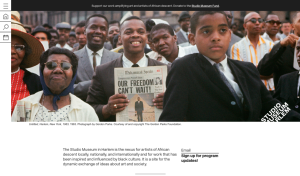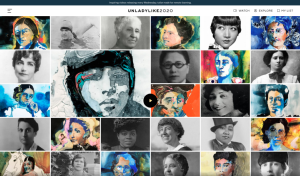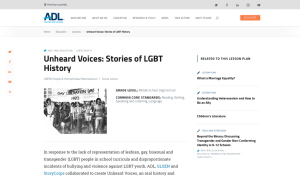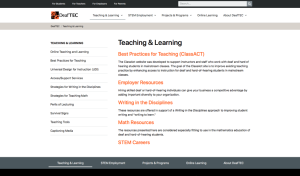General Interest
Back to Top
|
 |
|
The Studio Museum
|
Arts |
|
Explore the Studio Museum's 127 building on 127th St. in Harlem, New York from anywhere in the world with the Museum's online collections. Here, readers will find more than 2,500 works created by more than 600 artists spanning 200 years of history, "including paintings, drawings, sculptures, watercolors, photographs, videos and mixed-media installations." Digital versions of Studio Magazine, "a leading art publication with a focus on contemporary artists of African descent," are also available on the site. Plus, readers will find information about the Museum's longstanding Artist-in-Residence program. Since its inception in 1968, this year-long studio residency for emerging artists has served more than 100 artists of color. Under the Learn & Engage tab's Education sub-section instructors will find a series of downloadable lesson plans for art educators. These lesson plans are based on work by artists in the Museum's collection, such as "Light Brings Us Together" and "Black on Black," based on the work of Glenn Ligon; "Printmaking & Geometry," based on the work of Robert Blackburn; and "United Power," based on the work of Barbara Chase-Riboud. [DS] |
|





|
|
 |
|
The Readout Loud
|
Science |
|
Binge listen to all things biotech with The Readout Loud, a podcast that promises listeners a weekly deep-dive on the latest biotechnology news and advances. The Readout Loud is produced by journalism outlet STAT, which covers "health, medicine, life sciences and the fast-moving business of making medicines." Biotech and life sciences reporters Rebecca Robins, Damian Garde, and Adam Feuerstein host the show, which keeps listeners updated in less than half an hour. Unsurprisingly, COVID-19 has taken center stage in recent episodes. For example, Episode 120 provides updates on a coronavirus vaccine, and Episode 119 addresses the question, "how can hospitals protect workers from Covid-19?" In addition to listening to these episodes, readers can explore STAT's dedicated coronavirus page for continued COVID-19 coverage. The Readout Loud team discusses other important topics, too, including dismantling structural racism in the medical field and running a successful virtual conference. Readers can listen and subscribe to the podcast on iTunes, Spotify, SoundCloud, and Stitcher. [EMB] |
|





|
|
 |
|
UNLADYLIKE 2020
|
Social studies |
|
A project of PBS, UNLADYLIKE 2020 "profil[es] diverse and little-known American women from the turn of the 20th century, and contemporary women who follow in their footsteps." The collection features the stories of more than 20 women, including Gertrude Ederle (the first woman who swam across the English Channel) and Bessie Coleman (the first African American woman to earn a pilot license). On the Explore page readers can filter stories by the subjects' profession, identity, geography, and historical events (for example, "Civil Rights Movement" or "Industrialization"). Stories are presented as short films (usually around 10 minutes long) and are accompanied by a brief written narrative. Additionally, the stories come with extension activities, such as classroom discussion questions and lesson plans (check out the Learn page for more). Educators may want to introduce these videos into curriculums to "engage and educate [students] ... in an underrepresented narrative: how women, and in particular women of color, changed America 100+ years ago." The project was funded by several foundations and donors, including the National Endowment for the Humanities and the Corporation for Public Broadcasting. [EMB] |
|





|
|
 |
|
Makeover Monday
|
Science |
|
Calling all data designers: Join more than 1,600 fellow data visualization enthusiasts in honing skills and sharing ideas with Makeover Monday. The project offers a free "learning and development appointment with yourself." The site provides prompts and data sets to challenge users' data visualization mastery. Before diving in, it may be helpful to explore the "6 steps to your first #MakeoverMonday viz" graphic, found on the home page. As these steps explain, Makeover Monday releases a new data challenge each week. Visitors can view these weekly challenges (as well as archived challenges from 2016-present) under the Data Sets page (found in the Participate menu). Provided with a topic and a data source, users are encouraged to create a project and share it with the rest of the community. Designers can share their work via the Submit page (also under Participate) and on social media channels using #MakeoverMonday. To view other community members' submissions, check out the Makeover Monday website's Blog (found in the Learn menu) or Gallery (found in the Participate menu). For additional learning opportunities, readers should consider joining a weekly webinar. Check out the Webinars tab (under Learn) to view past and upcoming topics and create a free account for registration purposes. Makeover Monday is made possible by partnerships with The Information Lab, Exasol, I for Ideas, BrightTALK, and data.world. [EMB] |
|





|
|
 |
|
Road Trips Project
|
Social studies |
|
Many readers may have fond memories and photos of family or solo road trips over the years. The Road Trips Project preserves many of these travel pictures and perspectives from members of the South Asian American community. As contributor Neel Agrawal reflects, "traveling has a way of helping us navigate the many worlds that exist both inside and outside of ourselves." However, immigrants have often been excluded from these travel narratives about "the open road." This project reclaims space for their stories. On the Browse page readers can explore stories by individual (via the thumbnail and label) or location (via the pinpoints on the map). Each submission includes the name, starting point, destination, and date, as well as a picture, short story, and map displaying the road trip's path. The project also welcomes reader contributions on the Submit page. Road Trips is a project of the South Asian American Digital Archive (SAADA), a nonprofit striving toward "a more inclusive society by giving voice to South Asian Americans through documenting, preserving, and sharing stories that represent their unique and diverse experiences." [EMB] |
|





|
|

















